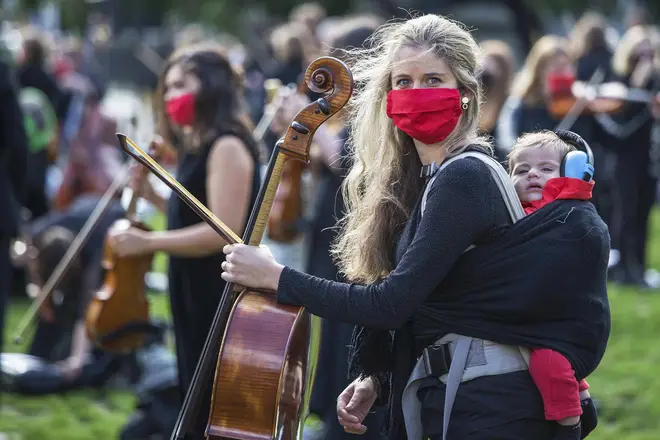On Air Now
Early Breakfast with Lucy Coward 4am - 6:30am
22 October 2020, 11:59 | Updated: 22 October 2020, 13:20

‘The entire ecosystem is being decimated’, says economist behind new research into the UK’s live music industry amid coronavirus shutdown.
The UK’s live music sector is facing the loss of 170,000 – 64 percent of the sector’s estimated 262,000 – jobs by Christmas, according to a stark new report.
The research, carried out by Media Insight Consulting for live music umbrella company Live, estimates the sector will be hit by an 80 percent decline in revenue this year, due to coronavirus restrictions.
Come Christmas and the end of the furlough scheme, half of the 52,200 permanent roles in live music are predicted to disappear. And of the 210,000 self-employed and freelance workers in full-time equivalent roles – that authors say have “effectively ceased to exist since March” – 144,000 are expected to lose their jobs.
Over the past month, musicians have warned that while they welcome the ongoing grants for venues through the government’s £1.57bn Cultural Recovery Fund, the plight of freelancers – who represent around 80 percent of music industry workers – is being left out.
Many fear of the dangers of ending the furlough scheme and have called on the government to introduce a ‘Seat Out to Help Out’ scheme to help venues reopen and operate in a safe and financially viable way, as prime minister Boris Johnson warned that severe restrictions could be in place for a further six months.
Read more: Culture secretary tells artists to ‘hang on in there’ amid industry crisis >

Let Music Live protest on London's Parliament Square
Researchers found that while welcoming the grants given to theatres and concert halls, 80 percent of employees are still unable to work due to increasing restrictions on public gatherings, and are reliant on the furlough scheme which ends this month.
In response to the research, a spokesperson for the government’s Department for Digital, Media, Culture and Sport (DCMS) said: “Our unprecedented £1.57billion Culture Recovery Fund, which builds on £200million from Arts Council England, is helping to stabilise organisations across the country, protect jobs and ensure work continues to flow to freelancers.
“We are working flat out to support our world class performing arts sector through these challenging times. Over three quarters of eligible people in the cultural sectors have benefitted from the [SEISS].”
Musicians previously warned that the SEISS only allows freelancers to claim 20 percent of their average monthly earnings, with reports saying 45 percent of musicians are not covered by the scheme at all. Today (22 October), the chancellor Rishi Sunak doubled the SEISS from 20 percent to 40 percent of monthly earnings, with a maximum grant now of £3,750 a month.
In anticipation of the furlough scheme ending, chancellor Rishi Sunak announced a new Job Support Scheme, for which he said only people in “viable” jobs will be eligible. However, it came to light that most musicians’ jobs wouldn’t be covered by the winter scheme, as only employees working a third of their usual hours are eligible.
Again, since this report came out, the scheme has been adapted and eligible employees will now take home at least 73 percent of pay for working a minimum of a fifth of their usual hours, rather than a third. There is currently a question mark over how this will impact self-employed workers, including musicians.
Hi @RishiSunak. As 70% musicians are unable to undertake more than a quarter of their usual work due to Government restrictions, and 36% do not have any work at all, will today's announcement include expanded support for our self employed members?
— Musicians' Union (@WeAreTheMU) October 22, 2020
👉 https://t.co/YJECeWzM1a pic.twitter.com/nkFMLi9Fym
“We were one of the first sectors to close and we will be one of the last to reopen,” said Phil Bowdery, Chair, Concert Promoters Association. “We are currently caught in a catch-22 where we are unable to operate due to Government restrictions but are excluded from the Extended Job Support Scheme as the furlough comes to an end. If businesses can’t access that support soon then the majority of our specialist, highly trained workforce will be gone.”
Andy Lenthall, general manager of the Production Services Association, said: “Those who have often found themselves overlooked and left behind throughout the last six months are the freelancers and self-employed – the people up and do the country that we rely on to bring us the live experiences we love.
“Things are becoming increasingly desperate for a great many people in the industry and Government needs to recognise that these crucial individuals need support.”

Spem in alium, performed by the Ora Singers at the Tate Modern in London
Campaigners argue the enormous economic value of the arts, which contribute £10.8 billion a year directly to the UK economy, will be at risk when restrictions ease, due to “mass redundancies and a talent drain that will impact any successful industry relaunch”.
During the pandemic, studies show nearly half of musicians have been forced to look for work outside the music industry, while more than a third do not have any work at all.
Economist Chris Carey of Media Insight Consulting who co-authored the new report added: “From the artists on stage, to the venues, and the many specialist roles and occupations that make live music happen, this research shows clearly that the entire ecosystem is being decimated.”